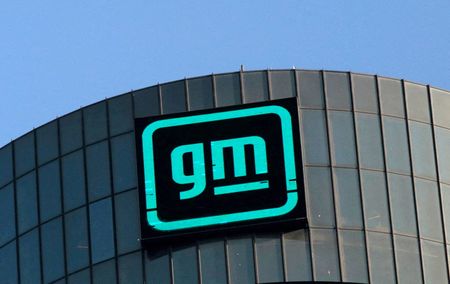By Jane Lanhee Lee, Joseph White and Stephen Nellis
OAKLAND, Calif/DETROIT (Reuters) -General Motors Co and chipmaker GlobalFoundries Inc on Thursday announced a long-term deal for the automaker to secure U.S.-made processors that will enable it to avoid the factory-halting chip shortages that kept millions of cars from being manufactured during the pandemic.
GlobalFoundries said the agreement for at least three years was the first of its kind and establishes a dedicated capacity exclusively for GM’s key chip suppliers at their upstate New York fabrication facility.
The announcement comes two days after President Joe Biden in his State of the Union address praised the passing of the $52 billion Chips and Science Act that aims to bring back chip manufacturing to the United States and points to a new approach by automakers to securing semiconductors.
It also highlights a new way that chip manufacturers can finance U.S. expansion, using a combination of funding from customers that want dedicated capacity for semiconductors and funding from the federal government.
GlobalFoundries Chief Executive Tom Caulfield told Reuters he believes supporting U.S. manufacturing makes the company competitive when seeking some of that funding.
“This is the automaker going right to the manufacturing foundry, reserving the capacity for their needs, making the appropriate co-investments with that foundry so that the best economics take place,” Caulfield said.
Caulfield said the GM capacity would be installed in an existing factory upstate New York, but declined to give specifics around how much of the factory’s output would be dedicated to the automaker.
GM told Reuters that it is working to streamline how many unique kinds of chips are in its cars. But it is securing capacity for its suppliers to have the chips made because the overall number of chips is expected to rise.
“We see our semiconductor requirements more than doubling over the next several years as vehicles become technology platforms,” Doug Parks, GM head of global product development, said in a statement.
‘HAND-TO-HAND COMBAT’
GM rival Ford Motor Co said last week that its inability to acquire chips and other supply chain problems contributed to a $2 billion shortfall in fourth-quarter profit compared with the company’s forecasts.
Ford Chief Financial Officer John Lawler, who is also interim head of the automaker’s supply chain operations, told analysts that securing adequate supplies of chips “continues to be hand-to-hand combat.”
Ford is putting “corrective actions in place,” Lawler said. “We’ve got better pipelines from brokers and spot buys. And we’re working very closely with our supply chain down to the Tier 2 chip suppliers.”
In late 2021, during the height of the chip shortage, GlobalFoundries and Ford announced a non-binding agreement that could involve increasing production capacity for Ford.
Few details of the Ford arrangement were provided at the time and few have been released since.
Caulfield said GlobalFoundries is talking to almost all the major global automakers, and that the GM agreement does not mean there will not be additional deals with other manufacturers.
By the end of 2023, almost 18 million vehicles will have been removed from production plans since the chip shortage began, according to Auto Forecast Solutions.
The auto chip shortage dramatically changed the way carmakers deal with their chip suppliers, with whom they previously rarely had direct contact.
Several auto companies have now created teams and divisions to better secure chip supply and think about the design of digital platforms for cars going forward.
Chip manufacturers told Reuters last year, it was time for the auto industry to carry some of the burden of the investment for the multibillion-dollar facilities needed for producing chips.
(Reporting By Jane Lanhee Lee in Oakland, Calif. and Joseph White in Detroit, Additional Reporting by Stephen Nellis; Editing by Bill Berkrot, Chizu Nomiyama and Marguerita Choy)


